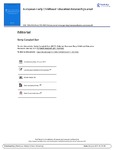Editorial
| dc.contributor.author | Campbell-Barr, Verity | |
| dc.date.accessioned | 2017-06-28T08:10:26Z | |
| dc.date.available | 2017-06-28T08:10:26Z | |
| dc.date.issued | 2017-07-04 | |
| dc.identifier.issn | 1350-293X | |
| dc.identifier.issn | 1752-1807 | |
| dc.identifier.uri | http://hdl.handle.net/10026.1/9556 | |
| dc.description.abstract |
Being asked to guest edit EECERJ has reinforced what I see as one of the great contributions of EECERA (through both its conferences and journal) – that of sharing ideas, practices, beliefs and theories on the care and education of young children. Any analysis of theoretical and empirical explorations of early childhood education illustrate that as a community there is a long history of sharing ideas on the care and education of young children (Georgeson et al. 2013; Miller and Cameron 2014). Sharing and comparing different approaches to early childhood education offers the advantage of helping to reveal what is taken for granted within our own cultures and opening up alternative possibilities (Tobin et al. 2009). However, despite the advantages of sharing ideas on the care and education of young children, the increased analysis of early education services by supra-national organisations risks ‘global panopticism’ (Lingard et al. 2013), whereby the global construction of early childhood education services acts a regulatory gaze as to the purpose of services and how they should be delivered and structured. The OECD’s proposed International Early Learning Study (IELS) is illustrative of the normative ways of thinking about early childhood education, whereby services are identified as a social good, supporting children’s lifelong learning (based on predefined desirable indicators) and offering early intervention to those from socio-economically disadvantaged circumstances (Moss et al. 2016). However, advocates of contextualised approaches to early childhood education would caution against a convergence of perspectives (Moss et al. 2016), identifying a need to appreciate that culture and history are central to explaining and understanding differences (Oberhuemer 2014; Tobin 2005; Tobin et al. 2009). Thus whilst considering the ‘other’ can offer alternative perspectives and open up new possibilities, the transfer of ideas may not always be possible or desirable. | |
| dc.format.extent | 477-482 | |
| dc.language | en | |
| dc.language.iso | en | |
| dc.publisher | Informa UK Limited | |
| dc.title | Editorial | |
| dc.type | journal-article | |
| dc.type | Editorial | |
| dc.type | Journal | |
| plymouth.author-url | https://www.webofscience.com/api/gateway?GWVersion=2&SrcApp=PARTNER_APP&SrcAuth=LinksAMR&KeyUT=WOS:000404630500001&DestLinkType=FullRecord&DestApp=ALL_WOS&UsrCustomerID=11bb513d99f797142bcfeffcc58ea008 | |
| plymouth.issue | 4 | |
| plymouth.volume | 25 | |
| plymouth.publication-status | Published | |
| plymouth.journal | European Early Childhood Education Research Journal | |
| dc.identifier.doi | 10.1080/1350293x.2017.1331032 | |
| plymouth.organisational-group | /Plymouth | |
| plymouth.organisational-group | /Plymouth/Admin Group - REF | |
| plymouth.organisational-group | /Plymouth/Admin Group - REF/REF Admin Group - FoAH | |
| plymouth.organisational-group | /Plymouth/Faculty of Arts, Humanities and Business | |
| plymouth.organisational-group | /Plymouth/REF 2021 Researchers by UoA | |
| plymouth.organisational-group | /Plymouth/REF 2021 Researchers by UoA/UoA23 Education | |
| plymouth.organisational-group | /Plymouth/Research Groups | |
| plymouth.organisational-group | /Plymouth/Research Groups/Institute of Health and Community | |
| plymouth.organisational-group | /Plymouth/Users by role | |
| plymouth.organisational-group | /Plymouth/Users by role/Academics | |
| dcterms.dateAccepted | 2017-01-01 | |
| dc.rights.embargodate | 2023-9-20 | |
| dc.identifier.eissn | 1752-1807 | |
| dc.rights.embargoperiod | Not known | |
| rioxxterms.versionofrecord | 10.1080/1350293x.2017.1331032 | |
| rioxxterms.licenseref.uri | http://www.rioxx.net/licenses/all-rights-reserved | |
| rioxxterms.type | Journal Article/Review |


